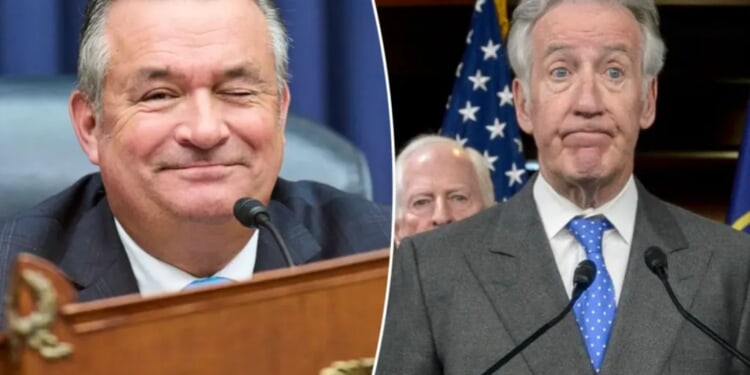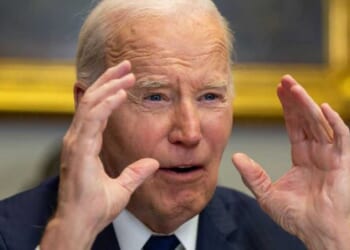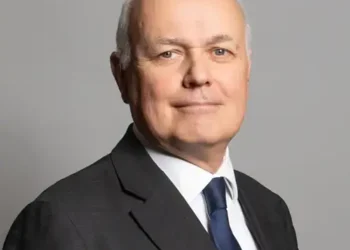The expiring enhanced Obamacare subsidies, which Democrats passed as COVID-19 relief in 2021 and 2022, have been a central issue preventing the parties from coming together to pass legislation to fund the federal government.
If the subsidies, also referred to as the enhanced premium tax credits, expire at the end of the year and the original income caps for the PTCs are reinstated, the Congressional Budget Office estimates that roughly 3.6 million people will no longer be able to afford health insurance, and the average premium costs for enrollees will more than double.
Representatives Don Bacon (R-NE), Tom Suozzi (D-NY), Jeff Hurd (R-CO), and Josh Gottheimer (D-NJ) outlined in broad strokes what they call a “statement of principles” for a negotiation extending the PTCs to avoid what health policy experts call the “subsidy cliff” for those priced out of insurance.
“Democrats and Republicans can sit down, listen to one another, and find common ground, especially when it comes to lowering health care costs,” the representatives said in a statement. “We may not agree on every ideal outcome, but we’ve identified a fair, reasonable path forward on the future of the Affordable Care Act’s Enhanced Premium Tax Credits. Compromise isn’t rocket science, and it shouldn’t be treated like a weakness.”
The plan includes a two-year temporary extension of the enhanced premium subsidies, several measures to cut down on fraud in the program, and an income cap that would be “phased out.”
Income caps
The representatives wrote that the income limit to continue to receive subsidized care would be “phased out between $200,000 and $400,000.” The offices of the representatives did not reply to the Washington Examiner’s request for further details on how this would look in practice.
Former President Barack Obama’s healthcare law originally set an income cap of 400% of the federal poverty line to be eligible for PTCs. That’s an annual income of $62,600 for an individual and $128,600 for a family of four.
The enhancement, passed by Democrats, temporarily removed income limits for individuals to purchase Obamacare marketplace insurance plans, resulting in a doubling of enrollment between 2020 and 2025.
Conservative health policy experts have suggested that a compromise measure could include income caps at 600% of the federal poverty level, which is $93,900 annually for an individual and $192,900 for a family of four.
Experts worry, however, that instituting a higher income cap will only raise the subsidy cliff, still posing a problem for enrollees on the margins of the new cap.
Temporary extension
The compromise outlines a two-year subsidy extension, allowing more time for negotiations to take place regarding permanent reforms.
Before the compromise measure was announced, Bill Hoagland of the Bipartisan Policy Center told the Washington Examiner that he suspected the enhanced PTCs would be extended for a limited duration and that other long-term reforms would require more time.
“If there is any kind of a deal to be struck at this late stage, with the open enrollment beginning here, it will probably [not be] a permanent extension,” said Hoagland.
Waste and fraud
The proposal also includes implementing “guardrails to prevent improper payments” for the PTCs.
Conservatives have claimed that there is rampant fraud in the Obamacare program, driven by the creation of zero-premium plans for individuals between 100% and 150% of the federal poverty level.
The Trump administration-aligned Paragon Health Institute published an analysis this summer that found as many as 6.4 million enrollees in 2025 do not actually qualify for zero-premium plans. It also estimates that enrollment in zero-premium plans has markedly increased because insurance brokers can enroll patients without their knowledge.
Paragon estimates that fraudulent enrollments in zero-premium plans cost taxpayers approximately $27 billion annually.
The bipartisan plan does not eliminate zero-premium plans but would prevent so-called “ghost beneficiaries” and require confirmation of eligibility.
The compromise would also require increased oversight of Obamacare insurance agents or brokers, as well as require recipients to be notified of the value that they receive from federal subsidies.
Enough to tip the scales?
It is unclear whether a compromise on extending the enhanced Obamacare subsidies would suffice to garner the necessary Democratic support to pass a government funding bill, since the subsidies are not their only demand.
The Democratic version of the bill to continue federal spending also repeals all healthcare provisions enacted as part of the One Big Beautiful Bill Act signed by President Donald Trump this summer, which reduces long-term Medicaid spending and restricts immigrant eligibility for Medicaid.
Republicans have argued in reply that Democrats have perpetuated the government shutdown because they want to fund Medicaid and healthcare expenses for illegal immigrants.
DR. OZ SAYS STATES SPENT $1 BILLION IN FEDERAL FUNDING ON ILLEGAL IMMIGRANT MEDICAID
Trump said during an interview with CBS’s 60 Minutes on Sunday that he would be willing to come to the negotiating table on healthcare reform if Democrats would pass a “clean” funding bill, temporarily keeping federal spending at current levels without inserting other partisan agenda items.
“They have to let the country open, and I’ll sit down with the Democrats, and we’ll fix it. But they have to let the country — and you know what they have to do. All they have to do is raise five hands. We don’t need all of ‘em,” Trump said.
House reporters Lauren Green and Rachel Schilke contributed to this report.
















